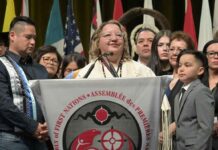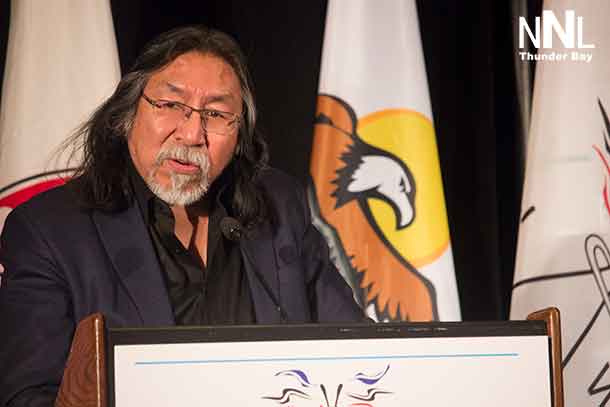 THUNDER BAY – Editorial – For many Canadians understanding the relationship between First Nations and Canada is difficult. The issue is often one clouded in a lack of understanding, shrowded in misinformation, sprinkled with racism, and surrounded by rhetoric. Between all of that, there is a long history where there have been mistakes made along with misunderstandings and opportunities both taken and missed.
THUNDER BAY – Editorial – For many Canadians understanding the relationship between First Nations and Canada is difficult. The issue is often one clouded in a lack of understanding, shrowded in misinformation, sprinkled with racism, and surrounded by rhetoric. Between all of that, there is a long history where there have been mistakes made along with misunderstandings and opportunities both taken and missed.
This is a topic that no single individual should claim to have all the answers or solutions. It is a long process, and this is a long read. If you need to go and grab a coffee, before you start, this might be the time.
When First Nations people protest, the reaction from the right side of the Canadian political spectrum is almost a ‘here we go again’, and ‘how much is this going to cost us this time?’ attitude. From the left there is a reach to help and support. Those reactions could be seen in the commentary from Ezra Levant from Sun News who cherry-picked his path in his editorializing last year over Attawapiskat.
They can be seen across the benches of the House of Commons in some of the comments made by government members as well.
The Conservatives have likely squandered a massive opportunity toward building a better relationship and more solid footing for First Nations. The path was there, and the Prime Minister took the first bold steps along that path when he made the historic apology for the residential schools issue.
Perhaps the real relationship is somewhere in the middle and will be found with all sides realizing that we must, as Ontario Grand Chief Beardy says “Run as One”.
From the beginning of Canada as our European history shares it, First Nations people were welcoming explorers to what they call Turtle Island. During the first winters that French explorers and settlers in Canada were here, it was with the help of the First Nations people that they survived. Consider a Canadian winter on what Europeans are used to, and that help was a critical component to make sure that the European foothold was here.
In the early days in what is now Northwestern Ontario, the relationship between the Ojibway and the Europeans was a business relationship based on trading for furs to fuel the growing demand in Europe for fur hats. There was a value added business relationship formed by both sides of the relationship.
Fort William was not a military fort, it was a trading post. Across Canada it was not a wild west movie as portrayed in Hollywood movies as much as a business relationship that formed between the Northwest Company and the Hudson’s Bay Company and First Nations people. It was far more though than just a business relationship hundreds of personal relationships were formed, and many real friendships. The entire race of Metis people formed as European men met and married Aboriginal women.
Somehow along the way, that business relationship has been broken. Right now the actions of the federal government are breaking personal relationships with long histories behind them.
Today the relationship is far less positive, and there is growing anger from First Nations peoples toward what they are seeing as the unilateral decision making by the federal Conservatives.
A friend of mine shared how in her view she feels what the government is doing is after putting people on distant lands and leaving them, that now that there is a huge bounty of mineral wealth, now instead of residential schools, the Harper government is looking to legislate them out of existence.
Likely the Conservatives would not see it that way, but changing how someone feels about your actions is almost impossible.
Some of that can be witnessed in Parliament, some from the comments and directions of the Government. The Senate has passed the legislation meaning the next step is law. That is unless the First Nations are able to appeal to either the Governor General or the Queen to step in and say ‘no’, and that is something that would likely generate a huge constitutional crisis.
Right now it appears the relationship is in serious need of professional counselling. Very seriously put, the comments from friends over the current situation are strong and serious and coming from people who are normally not all that political. The Conservatives likely have no idea on how offended these action have made many First Nations people.
The Conservatives through their actions have made people who have never been political activists before into political activists. Perhaps they need to reflect on how the Reform Party of Canada came into being, and formed the basis for what the Conservative Party has become today.
For many Canadians the Senate is a place where we have little knowledge and even less understanding of what it does. The Canadian Senate is a body of representatives appointed by the Prime Minister, who are tasked to review legislation passed by the House of Commons.
As debate continued in the Senate over several pieces of legislation that are set to impact First Nations, and are leading to a growing number of protests along with a hunger strike by Attawapiskat Chief Spence, the political focus shifted from the House of Commons to the Senate. On Thursday the debate in the Senate was over ‘time allocation’ of the measures with the government Senators seeking to halt debate at six hours of ‘sober second thought’ before it passes.
 Opposition side Senators are expressed deep concern over the scope of Omni-bus legislation which puts massive change into effect under a single piece of legislation.
Opposition side Senators are expressed deep concern over the scope of Omni-bus legislation which puts massive change into effect under a single piece of legislation.
Senator Tardiff stated, during debate, “Is there a particular urgency to the passage of this bill? None that I have seen or heard from the government. In fact, it is difficult to learn anything at all about this bill simply by listening to the government. Perhaps this is the objective of the government. Nobody is certain of the entirety of the content of this bill. As many have already mentioned, we are dealing with one of the largest budget implementation bills in the country’s history. If you take something this complex and rush it through Parliament fast enough, maybe no one will notice the things you are hoping they will not notice”.
Senator Cowan said, “The changes to the Navigable Waters Protection Act of course are far from the only controversial sections of this omnibus budget bill. Last week, Canadians witnessed a group of First Nations chiefs coming to the door of the other place, trying to enter during the debate on this legislation. Their voices, they said, were not being heard on a bill that was going to affect them very directly and immediately. Since then, there have been more demonstrations across the country, in Calgary, Edmonton, Regina, Saskatoon, Winnipeg and Kenora.
“First Nations are particularly concerned about the amendments to the Navigable Waters Protection Act, the amendments to the Fisheries Act and the amendments to the Indian Act”.
During the 2011 federal election, from the Conservative Party Platform;
Stephen Harper’s Government has taken strong action to support new opportunities and a higher quality of life for Canada’s Aboriginal peoples.
Through Canada’s Economic Action Plan, we have made substantial investments in; better infrastructure in First Nations communities – including new and better housing, schools, drinking-water and wastewater systems, and health and police infrastructure; and providing new investments in First Nations Land Management, allowing First Nations to promote the development of their reserve lands and resources – a policy which has already led to new greater investment on reserve lands and more job opportunities for both Aboriginals and non-Aboriginals; expanding adult basic education programming in the territories, which will help increase education and employment levels among Aboriginals in the North; supporting environmental safety upgrades to the fuel tanks that power essential community infrastructure in many remote and rural First Nations communities; and promoting the deployment of clean energy technologies in Aboriginal and Northern communities”.
Those were the promises made in the platform. That none of what the Conservative Party now appears to be doing are in that platform is likely one of the cornerstones for the ongoing conflict brewing across Canada with First Nations.
This is a long read, but it is a huge issue too, one that deserves far more than 15 second soundbites. It deserves taking the time
From the Hansard of the Debate in the Senate:
Hon. Lillian Eva Dyck: Honourable senators, I rise today to speak to Bill C-27, the First Nations Financial Transparency Act. This bill expands upon and goes beyond the private member’s bill of Kelly Block, Member of Parliament for Saskatoon-Rosetown-Biggar, Bill C-575 in the last parliament.
The goal of this bill is to require First Nation governments to publish their audited, consolidated financial statements annually and to require that a schedule of chief and council salaries and expenses also be made public. The method to make these statements public is twofold. First, First Nations must publish audited financial statements and chief and council salaries and expenses on their own website or other website operated by the First Nation. Second, the minister will publish the same information on the website of Aboriginal Affairs and Northern Development Canada.
Honourable senators, transparency and proactive disclosure are important goals for all governments, including First Nation governments, and these are goals that everyone supports, including me. While on the surface this bill looks positive, the government has once again failed to treat First Nations as equal partners in developing this legislation.
Bill C-27 is yet another piece of legislation that this government is pushing through the legislative process without any prior consultation and accommodation with First Nations. As such, it has only proven to add to the deteriorating relationship between the federal government and First Nations across Canada. This deteriorating relationship has been exemplified everywhere lately — from the frustrated chiefs who tried to gain entry into the other place last week, to the thousands of First Nations youth who have gathered in protest and rallies under the “Idle No More” banner, including 500 who rallied outside of Kelly Block’s constituency office in Saskatoon this past Monday.
However, honourable senators, the truly disheartening thing is that First Nations across this country are willing to be partners in reforms on governance, especially on issues of transparency and accountability. As Senator Patterson mentioned in his remarks, the Assembly of First Nations has already passed a resolution that requires First Nations to make public financial information to their membership. Instead of approaching First Nations as equal partners in Bill C-27, this government continues to treat them as dependent adult children.
As this bill moves to committee, I would like to point out three problematic issues I see with this bill: one, the duty to consult and accommodate First Nations; two, the scope of financial reporting; and, three, the mechanism for enforcement.
Like previous bills affecting First Nations that this government has introduced in this Parliament, the Conservative government has once again failed to carry out its duty to consult and accommodate First Nations on the drafting of the legislation. Instead of sitting down with First Nations and consulting with them on the provisions of this bill, the government introduced this bill with much fanfare at the Whitecap Dakota First Nation, just outside of Saskatoon.
According to the testimony of Chief Darcy Bear, the government did not even allow Chief Bear and/or his councillors to actually read the bill before the minister announced it on their reserve. Chief Bear wrote to his Conservative MP on December 11, 2011, and stated:
I do wish to point out that when we were asked to endorse the new Bill we were only provided with a backgrounder on November 22, 2011. We did not receive a copy of the actual draft Bill until it was introduced in Parliament on November 23rd, 2011, which was after our press conference of that same day. We did not have the opportunity to review and analyze Bill C-27. . . . I do wish to emphasize that we provided our endorsement of the new Bill C-27 based on our support for the former Bill C-575.
At the committee hearings in the other place on the bill, Whitecap Dakota First Nation Chief Darcy Bear brought up several issues with the bill, issues that could have easily been addressed had the government lived up to their constitutional obligation to sit down and consult with First Nations across the country. In addition, the government amendments at the committee stage of this bill in the other place only represented the concerns of one First Nation, the Whitecap Dakota First Nation.
Again, I repeat, if only the government had lived up to their constitutional obligation to sit down and consult and accommodate the concerns of more than one First Nation at committee amendment stage in the other place, then the bill before us would be better suited to address the transparency concerns of First Nations and would have their support rather than their opposition.
Honourable senators, I will now turn to the issue of the scope of reporting in this bill. As I have noted earlier, transparency and financial accountability are a necessity for the health of First Nation governments. It is what allows a government’s citizens to hold them to account. I have heard from First Nation members who have been denied such information from their band offices. These cases, where First Nation members are denied this critical information, are unacceptable, but what this government has failed to recognize is the appropriate accountability relationship for the disclosure of this information. First Nation governments must be accountable, first and foremost, to the members of the First Nations that they represent. This is the correct accountability relationship.
Reporting requirements should be focused on making sure that members of a First Nation have access to the appropriate information to hold their leaders accountable. The proactive public disclosure provisions in this bill should, therefore, be directed to First Nation citizens, rather than to the public at large. As AFN Regional Chief Jody Wilson-Raybould stated:
First Nations should be responsible for determining the rules that apply to our governments and governing bodies.
However, as I stated earlier, this bill goes far beyond that scope. It requires the Minister of Aboriginal Affairs and Northern Development Canada to publish this information on the federal government website for Canadian citizens at large. This has the unfortunate potential to create an environment of sensationalism and misunderstanding of the numbers reported. This has already happened in the recent past. Simply posting salary figures and financial reports without any context or background has already led to great misunderstanding and takes away from the real issues that are critical in First Nation communities, such as the underfunding of education and health.
The Canadian Bar Association has noted in their letter to the minister on Bill C-27:
By focusing only on the expenditures of First Nations, the proposed legislation fails to address larger systemic issues of funding and responsibility for those issues.
Additionally, under the current reporting requirements, the reporting of salaries and expenses may still lead to confusion and misrepresentation of the facts. The reporting of chief and council salaries still requires First Nation leaders to include compensation in their personal capacity. This not only creates serious privacy concerns, but also the possibility of misleading information being disclosed regarding First Nation leaders’ compensation.
This bill goes well beyond the intention of its predecessor, the private members’ bill, which dealt only with posting information regarding the salaries of First Nation chiefs and councillors in their capacity as First Nation government officials. What we have now in Bill C-27 is a further requirement for chief and council also to post information about personal income from sources other than Aboriginal Affairs and Northern Development Canada.
Finally, the power vested in clause 13 allows the minister to withhold funding to First Nations that are not compliant with the reporting requirements of Bill C-27.
(1530)
As the clause currently reads:
13(1) If a First Nation is in breach of any duty imposed on it under sections 5 to 8, the Minister may take one or more of the following measures:
(a) require the council to develop an appropriate action plan to remedy the breach;
(b) withhold moneys payable as a grant or contribution to the First Nation under an agreement that is in force on the day on which the breach occurs and that is entered into by the First Nation and Her Majesty in right of Canada as represented by the Minister, solely or in combination with other ministers of the Crown, until the First Nation has complied with its duty; or.
(c) terminate any agreement referred to in paragraph (b).
Honourable senators, clauses 13(1)(b) and 13(1)(c) are simply wrong. Withholding or terminating funds for non-compliance could result in the federal government failing to meet its constitutional obligation to provide essential services to First Nation Canadians. If an issue exists with a First Nation’s chief and council not being compliant with Bill C-27’s reporting requirements, it is outrageous that the mechanism of enforcement would be to cut off funding to the entire First Nation, which would hurt the entire First Nation community. The clause as currently written makes all grants and contribution agreements vulnerable to the funding being withheld or terminated, including funding for education, health, water infrastructure and housing.
A better solution, so that the minister does not punish the most vulnerable First Nation citizens, would be to simply withhold the salaries of non-compliant chiefs and councillors. It is better to give band members, and not the minister, the authority to direct the band office manager and/or other officials responsible for issuing payment to chief and council to stop paying their salaries and expenses until they have disclosed the necessary information about their salaries and expenses to their membership.
It is unconscionable and outrageous that in the 21st century, the Conservative government is giving the Minister of AANDC the draconian power to terminate or withhold funding to First Nation bands who do not post on the web their audited, consolidated financial statements.
In the other place, at third reading of the bill, the government put time limits on debate; in other words, it did not allow a fulsome, open and transparent accounting of why the Conservatives refused to incorporate numerous opposition amendments that would have improved the bill from a First Nation perspective. Why did the Conservatives vote against amendments that would have disallowed the minister to cut off funding to non-compliant First Nation bands?
First Nation leaders and chiefs are already upset with the lack of consultation and accommodation regarding the latest omnibus budget bill, Bill C-45, in which there are numerous provisions that significantly affect them. Introducing Bill C-27, the First Nations financial transparency bill, only adds fuel to the fire of frustration over a discernible pattern of continued erosion of the rights of First Nations to govern themselves.
Over the last year, the government introduced in the Senate, rather than in the other place, three bills that affect First Nations. We tried valiantly to introduce amendments, but the Conservatives voted them down.
We had Bill S-2, the matrimonial real property on reserves bill, which gives matrimonial property rights to non-First Nations living on reserve. This clearly is not right.
We had Bill S-8, the safe drinking water for First Nations bill, which actually deliberately derogated or took away from the inherent constitutional rights of First Nations.
We had Bill S-6, the First Nations elections bill, which allows the minister to force First Nations to come under its provisions rather that allow them the option of entering into it.
We now have before us in the Senate yet another bill that follows the same pattern — an erosion of First Nation rights to govern their own affairs, combined with granting more power to the minister. Yes, granting more power to the minister. In the 21st century, the Conservative government is practising a 19th century style of colonial paternalism towards this land’s original, indigenous peoples — the First Nations.
While there are a small number of chiefs or councillors who may refuse to post information regarding their salaries or expenses, the consequences for non-compliance should be directed specifically to them and not to the First Nation community as a whole. Withholding funds or terminating funding agreements punishes the other people who have not done anything wrong. Women and children will be punished. Surely the government could have taken a much simpler and more direct measure to ensure compliance — and that would be to ensure that the salaries of the chiefs or councillors are withheld and not the overall funding to the First Nation community.
Every day there is an escalation of frustration by First Nations because the governing party is not listening and responding to legitimate concerns. The chiefs and the youth in the Idle No More movement have risen up. Today, at noon, First Nation people from Attawapiskat were on the steps of the Parliament Buildings, asking the government to hear Chief Spence’s concerns and to visit her while she is on a hunger strike on Victoria Island, not far from Parliament Hill.
They government can help end the tide of First Nation protests sweeping across our country. They can help end the hunger strike by Chief Spence. They can help end the roadblock in Alberta. All they have to do is admit that this bill has serious flaws that should be fixed before it is passed.
Here in the chamber of sober second thought, where we are supposed to demonstrate wisdom, do honourable senators on the opposite side have the wisdom and courage to do the right thing for First Nation people? Do they have the wisdom and courage to propose amendments to improve this bill? Will they have the wisdom to support amendments that First Nations request of us? I sincerely hope they do.






